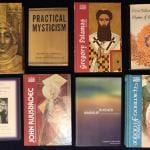In my book Unteachable Lessons I talk about Kenneth Leech, the Anglican priest who wrote a variety of books on topics related to both contemplative spirituality and the struggle for social justice (if you’re not familiar with Ken Leech, check out Prayer and Prophecy, an anthology of his most essential writings).
I only met Ken on a handful of occasions. When I ran the bookstore in Sewanee (the site of an Episcopal seminary), he came in to the store while he was on campus and we chatted for a bit. Several years later, I had a spiritual director who was an old friend of Leech’s, and so whenever Ken was in the USA he would visit Georgia to see his friend; and on several of those occasions I got to spend some time with Ken as well.
Ken taught me a lot. He was very impatient with spiritual writers whom he saw as succumbing to the trappings of celebrity; he himself tended to shy away from the spotlight, preferring the ordinary work of parish ministry in one of London’s most economically-challenged neighborhoods. Like any seasoned Christian contemplative, Ken tended to value humility, earthiness and ordinariness as the marks of a mature spiritual life.
A Thought-Provoking Conversation
One time when Ken was in Georgia I took him out for breakfast, and as we chatted I must have made a comment about wanting to be a mystic. I don’t remember what exactly I said, but even after almost 25 years, his response is seared into my memory.
“Whatever you do, don’t call yourself a mystic,” he said with typical bluntness.
“Why not?” I asked, brow furrowed. After all, here in America we have this idea that if you want something, you go after it — and naming it is an important step on the way to making it real.
“Calling yourself a mystic would be like calling yourself a saint, or a shaman,” he replied. “If you really want to be such a thing, it’s far more important to live it than to just talk about it. If you are really a mystic, other people will see it. Let them call you a mystic; you don’t need to claim that name for yourself.”
I felt a bit stung by this rebuke, even though it was delivered in a gentle and civilized-British way. But his analogy made sense. If anyone went around proclaiming that they were a saint, most people would see them as foolish at best, if not downright prideful and arrogant.
A real saint doesn’t need PR. You simply live a saintly life. The Catholic Church, which is the only organization I know of that’s in the saint-accrediting business, won’t even consider your cause for canonization until after your death. I’m sure there have been countless people who live truly saintly lives that are now lost in the mists of history. But that’s okay: part of true sanctity is a spirit of humility that doesn’t really mind if it ever gets acknowledged publicly.
It’s so important to keep in mind that Ken was not saying “don’t aspire to be a mystic” or “don’t live like a mystic.” In fact, he was encouraging me to do precisely those things! In schooling me on a basic principle of humility — don’t call attention to yourself — he was, paradoxically, encouraging me to do what really mattered in contemplative spirituality: to walk the walk rather than talk the talk.
There’s a song in The Rocky Horror Picture Show that proclaims, “Don’t Dream It; Be It.” In other words, if you have a desire in your heart, don’t just daydream about it: make it real. Applying this to Ken Leech’s comments: don’t just talk about being a mystic when you can more quietly do the unglamorous work of living a contemplative life.
Why We Like to Say We’re Mystics
I think a lot of people might like to call themselves mystics because they want a shorthand way of explaining that they are more interested in an experiential spirituality, as opposed to a religious observance that is defined by believing the approved things and conforming to the social expectations of a church. But is mysticism just something we “experience”? I’ve already written at length about why I think the notion of experience sometimes fails us. Just as there is more to love than just the experience of falling in love, so too there is more to the mystical life than just having experiences of God’s presence in our lives.
Don’t get me wrong: there’s nothing wrong with experiencing a sense of God’s presence. I wish everyone could have such experiences! But an experience of God is not the goal of mysticism: if anything, it’s just the entry point.
What, then, is the goal of mysticism? Probably the best one-word definition would be the Greek word theosis or its Latin equivalent deification — the goal of the mystical life is union with God, which means living a God-infused life. It’s not so much about what we feel or experience, as how we conduct our lives: in a manner shaped by love, compassion, kindness, forgiveness, mercy, and all the fruit of the Spirit, including joy, peace, patience, gentleness, and so forth.
When I took Ken Leech’s word of caution to heart, here’s what it meant for me: if I’m interested in mysticism (which I was, and still am), what matters the most to me is not “being a mystic” — whether in my eyes, or anyone else’s — but rather living a mystical life. And that, more than anything else, inspired me to begin to take seriously the practices that have for centuries now been associated with mystical and contemplative spirituality: including silent prayer, lectio divina, a regular daily prayer habit, and a focus on cultivating basic virtues such as simplicity, faith, trust, and yes, humility.
Many years have passed since that breakfast with Ken. He passed away a few years back, and I’m sad that he’s gone (he was always gracious enough to answer my letters or emails). Nowadays, from time to time I meet people who describe themselves as mystics. Usually there seems to be more enthusiasm than arrogance in their choice of words, so generally speaking, I let it pass — I figure we all have the right to define ourselves. But at least for myself, I still agree with Ken. If you want to call yourself a mystic, that’s your business — but I tend to be most impressed by people who simply do the work of cultivating a contemplative heart. Do that work, and as far as I’m concerned, you’re a mystic, whether you say so (or feel like it) or not.













